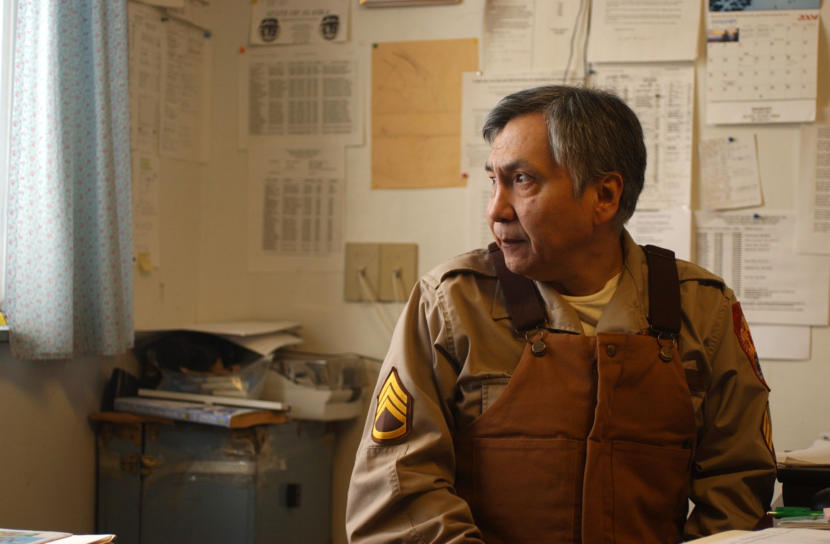
This article was produced in partnership with ProPublica as part of the ProPublica Local Reporting Network and is part of a continuing series, Lawless: Sexual violence in Alaska.
RUSSIAN MISSION — One spring day in 2005, a man in a crisp brown uniform stood before a group created by Congress to fix rural Alaska’s lack of cops. In his soft-spoken way, Simeon Askoak explained his dilemma.
He was the only law enforcement officer in Russian Mission, a village of 340 people where he was born and raised. He’d worked as a village public safety officer for the previous 13 years, and while the state of Alaska covered his salary, he lacked equipment, resources and respect.
“It’s degrading me,” Askoak said of the constant search for money to pay for the basic necessities of his job. He described how his city government couldn’t afford utilities for the police station, so he dug into his own pocket to buy heating oil to warm the jailhouse. When his family of seven could no longer afford the bills, the pipes at the jail froze. Soon the water and sewer would be shut off too, he warned.
VPSOs in other riverside villages spoke of similar fears.
-
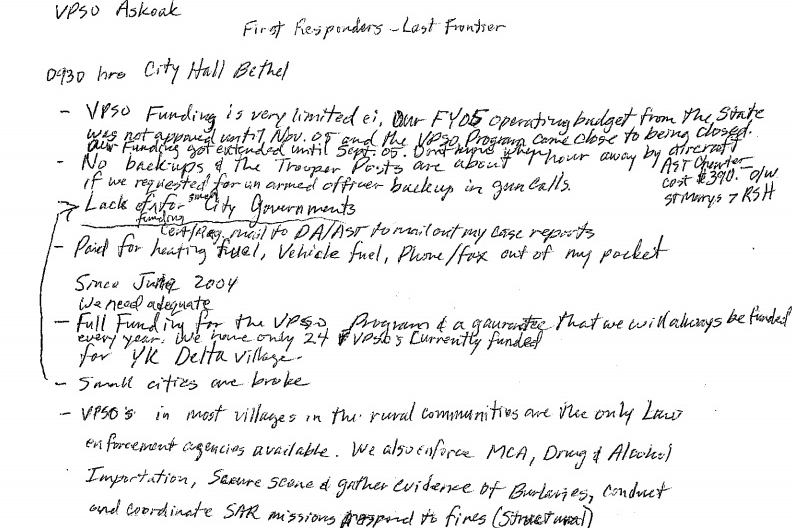
VPSO Simeon Askoak’s handwritten notes from April 2005.
“We are the first responders,” Askoak said, describing the unique role VPSOs play in the state. They bust drunken drivers, bootleggers and drug dealers. They listen to children tell of being molested, stand between abusers and domestic violence victims, and pull bodies from the rivers. Always unarmed and usually without backup.
Having told his story, Askoak left the meeting and flew home in a rattling bush plane above a tangle of streams and spongy tundra. Two days later, he followed a trail to a lagoon 100 yards from his front door and shot himself in the chest.
He was 50 years old. A boy found his body shrouded in newly fallen snow.
Russian Mission hasn’t had a permanent, certified police officer since. Fourteen years after Askoak’s death, a generation of children in the Alaska Native village, including his grandchildren, is growing up in a town left to fend for itself.
In a region with the highest rate of homicide and accidental death in Alaska, where half of women experience sexual assault or domestic violence, offenders here have learned they can simply hide from visiting state troopers to avoid arrest. Others face do-it-yourself justice.
Not too long ago, a group of residents tackled a man who had been firing a gun in Russian Mission. They duct-taped him and held him in the jail until the troopers landed.
Thirty-eight VPSOs statewide — and shrinking
In every meaningful way, the splintered and inequitable system of rural Alaska law enforcement described by Simeon Askoak in 2005 is worse today. An investigation this year by the Anchorage Daily News and ProPublica found that one-third of communities now lack public safety officers of any kind. Some small cities without a VPSO or state trooper resort to hiring criminals as cops.
The creators of the VPSO program, which is funded by the state government and run by regional Native nonprofits, hoped to meet two goals: Grow local law enforcement by training and certifying village residents as police, while greatly increasing the number of communities with first responders. The officers were meant to be all-around lifesavers, trained to launch search parties, perform CPR and fight house fires.
The Daily News and ProPublica have found that despite heroic efforts by individual officers, the VPSO program itself is failing rural Alaskans and most Alaska villages it was intended to protect. When Askoak began working in 1992, there were more than 100 VPSOs deployed across the state.
Today? Thirty-eight and shrinking.
Instead of homegrown hires, the majority of officers are imported, unfamiliar with the regions and cultures they serve; many have never been to Alaska.
What’s more, those few remaining VPSOs are not necessarily based in the villages where they are needed most. Whether a community gets an officer depends on several factors, such as available housing, that have nothing to do with crime rates.
Near the Canadian border, the town of Eagle has a mostly non-Native population of 80 people and sits beside a state highway. It has a VPSO.
The village of Nunapitchuk, on the other side of the state, is eight times larger with a mostly Yup’ik population and does not have one. When a man fired his rifle at a family member there in June, troopers had to fly to the village and climb on a boat to catch up with him.
Despite abysmal retention rates, high overhead costs and disagreements between the state and regional employers on how to manage and fund VPSOs, the federal government is doubling down on the program. U.S. Attorney General William P. Barr in June declared a national “law enforcement emergency” in rural Alaska, promising $10.5 million in emergency funds for “hiring, equipping and training” VPSOs and other village-based police. (At the Alaska Federation of Natives convention this month, he announced an additional $42 million in tribal grants and victims assistance.)
Alaska Native leaders say the aid is welcome and necessary, but they warn that a one-time infusion of money will not fix systemic problems.
“It will do little or nothing to actually move the needle in my view,” said Ethan Schutt, the Athabascan chief of staff for the Alaska Native Tribal Health Consortium and one of the commissioners who heard Askoak’s plea before his death.
The decline of the VPSO program might be less of a crisis if more state troopers protected rural Alaska. But our investigation also found half of the state’s 236 troopers work as highway patrolmen and are de facto police for suburban, mostly white communities such as the Matanuska-Susitna Borough, home of Gov. Mike Dunleavy and where former Gov. Sarah Palin got her start.
While some troopers fly from hub cities to investigate emergencies, only 25 troopers — about 11% — were posted in remote villages full time as of Sept. 30.
All these factors result in a basic lack of first responders and emergency services in Alaska’s most remote communities. Alaska Federation of Natives President Julie Kitka said this system is unacceptable and must be overhauled with sustained and robust funding, federal partnerships and local control under village and regional leaders.
Alaska Public Safety Commissioner Amanda Price said the VPSO program in its current form may no longer be the answer.
“At what point do we say maybe this doesn’t work?” Price said in an interview in August.
‘People work together at times when things get rough here’
Simeon Askoak’s Yup’ik ancestors lived in Southwest Alaska for thousands of years. Descended from settlers who crossed on the vast land bridge that stretched between what is now Siberia and Alaska, the Yup’ik people hunted seal and beluga along the Bering Sea coast.
More recently, Yup’ik societies began to make their way from the coast up the Yukon River, building settlements and seasonal camps. The river delivered salmon; hunters stalked caribou in the fall. One such camp became a trading post and later the village now known as Russian Mission.
-
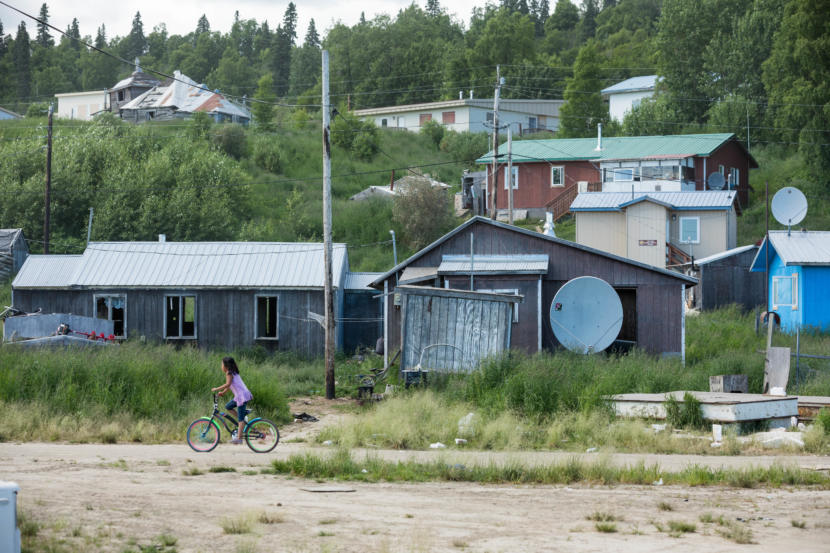
Syra Kozevnikoff, 9, rides her bicycle along a road on June 28, 2019 in Russian Mission. The tan building behind her is the village public safety office, which has three jail cells that are rarely used. (Photo by Loren Holmes/Anchorage Daily News)
Elders recall growing up here and in nearby camps, attending school in a log cabin lit by kerosene and learning English as a second language. Members of the generation after that, Askoak’s generation, were shipped to boarding schools hundreds of miles away, where they were punished for speaking their Native languages and suffered physical and sometimes sexual abuse.
The oldest woman in Russian Mission is 90-year-old Marie Askoak, Simeon’s aunt. There was no electricity when she was a girl, she said. No phones. Certainly no police, lawyers or judges that she can recall. Marie thought back. Wrapped in warm layers of clothes, a lavender qaspeq and department store fleece, her brown eyes searched the room.
-
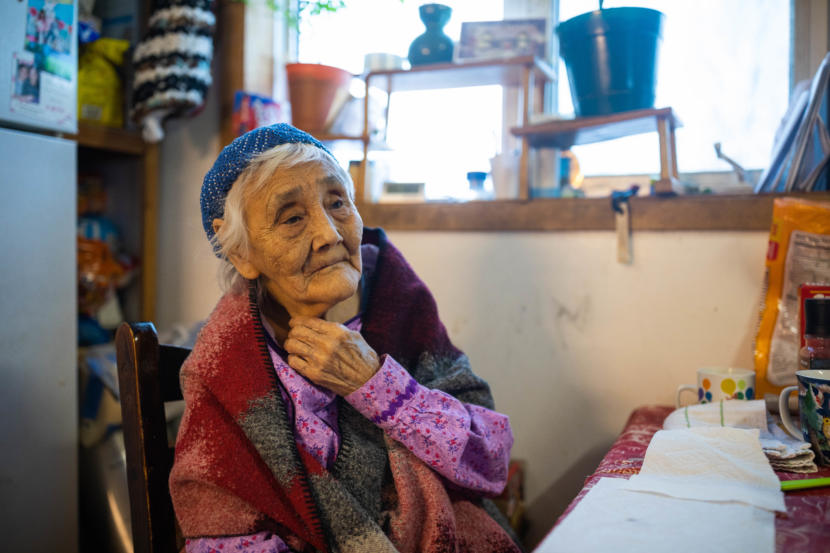
Marie Askoak, 90, sits at her kitchen table on March 7, 2019 in Russian Mission. Askoak is the oldest person in the village. (Photo by Loren Holmes/Anchorage Daily News)
Maybe there were fish and game wardens, she said finally. They began to come and take people away for hunting violations. Asked how the community historically handled crimes or disputes before the arrival of the state justice system, Marie answered in Yup’ik.
“People work together at times when things get rough here. There used to be no police officers, no nothing,” she said through an interpreter. “But there was a brotherhood and sisterhood. They work together.”
The way the village resolves conflict and fights crime is not so different now.
“If it comes down to it, we have to call Alaska State Troopers,” said Daniel Askoak, the youngest of Marie’s 10 children. “But usually when something happens we come together and talk to the person.”
Sometimes it takes more than talk. When things get truly dangerous, villagers have a choice: hunker down and wait for troopers to arrive by plane or take matters into their own hands.
Making do
Across Alaska, communities that once had certified police thanks to the VPSO program now make do with low-paid, untrained police or no law enforcement all.
Alakanuk, a Yup’ik village of 728 people at the mouth of the Yukon River, had a VPSO in town until recently. In January, once he was gone, a man in the village was stabbed in the chest by a family member. The next month, on Valentine’s Day, a 43-year-old was said to have committed rape, kidnapping and assault, and to have given alcohol to a minor, according to charges filed in state court. In July, a man jumped into a river slough and drowned.
The Western Alaska region that includes Alakanuk and Russian Mission employed about 20 VPSOs when Simeon Askoak testified in 2005. Now four remain among some 48 villages.
The Southwest Alaska village of Manokotak once had two VPSOs; today it has none. In 2013, one of the officers was shot to death while checking on a man who was thought to be suicidal. The need for certified police officers remains as great as ever. A man holding a 1-month-old child in his arms punched two village elders last fall and had to be restrained by family members of the victims, according to troopers. A shooting followed in July. The month after that, troopers surrounded the house of a man threatening to “go on a killing spree” if anyone came inside.
Russian Mission has had a few city-hired village police officers over the years, residents say, but no permanent VPSOs since Askoak. His absence is felt in a thousand ways. One series of attacks involving a young couple illustrates the difference between a village with a trusted local police officer and one that must rely on troopers working an hour away.
In 2004, the year before Askoak’s death, someone called 911 to say that a muscular former basketball star named Lester Pitka had slammed his 16-year-old girlfriend’s head to the floor. In an affidavit, Askoak wrote that he arrived at the scene three minutes later, saw Pitka on top of the girl and stopped the beating.
Other VPSOs called Askoak “the sweet talker” because he convinced people they shouldn’t run when facing arrest, his widow said. “If you do that, it’ll just be another addition to your charges,” he would say.
“He’d tell them, ‘I don’t want you to do this because I care about you.’”
The man he arrested was his nephew. Interviewed in a state prison, Pitka said by phone that he understood and held no grudges. “It was never personal with him. He was just doing his job.”
In the years following Askoak’s death, public records suggest, Pitka learned he had plenty of time to disappear before troopers could arrive to investigate. In 2007, a woman called troopers to report that Pitka, then her boyfriend, had spit in her face and yanked her hair at the city office. With no police in town, the woman said, she was afraid for her safety and planned to stay with her mother until help arrived.
When the trooper landed the next day, Pitka was nowhere to be found.
“I searched throughout Russian Mission … but was unable to locate him,” the trooper wrote in an affidavit filed in state district court. “I was advised by several witnesses that he was hiding to avoid arrest.”
The trooper handed the victim a pamphlet about domestic violence and flew home. A judge issued a warrant for Pitka’s arrest, but there was no certified officer to serve it. Pitka avoided capture for the next two weeks.
As Russian Mission grew accustomed to life without a cop of any kind, the attacks by Pitka continued. Sometimes troopers came within two hours. Sometimes not for days.
At 3 p.m. on Nov. 24, 2009, a woman called 911, screaming. Pitka could be heard in the background, troopers wrote. The line went dead.
A trooper flew to the village on a chartered plane, landing an hour and 20 minutes after the 911 call. He found the victim crying at the village City Hall.
“She stated Lester said he was going to beat her up, and if troopers showed up he would hide so he could not be found,” according to the charges. “And after that he would beat her up so that he would have a reason to go to jail.”
The following year, Pitka yanked the same woman by the hair so hard that a clump came loose the next time she combed. She was seven months pregnant at the time. There is no record of troopers flying to the village until 11 days later. He pleaded guilty to domestic violence assault. In 2012, Pitka pleaded guilty to a felony assault charge after a pregnant woman called for help to say he had put a cigarette out on her cheek.
Today, Pitka is in prison awaiting trial on a new felony domestic violence charge. He is accused of choking a woman in front of her children April 24 in Juneau. (In that case, the woman called 911 and a Juneau police officer immediately took him into custody. He has pleaded not guilty.)
Pitka declined to talk about specific details of various cases against him, other than to say they were all alcohol-related. But he said he felt troopers — and the state’s justice system overall — assume Alaska Native suspects are guilty.
“I’d rather have someone like Simmy. A VPSO, a Native,” Pitka said. “He would want to help somebody rather than put them in jail.”
Pitka wouldn’t say where he hid, or how, but the village sits along a steep hillside overlooking the curve of the Yukon River, with countless islands and trails spreading in every direction for 100 miles. In Russian Mission and other Western Alaska villages, residents said the tactic of hiding from troopers to avoid arrest remains common.
“They can run anywhere in the trees back here, or on a boat out to the fish camps, knowing the troopers won’t go after them,” said Darlene Nickoli, who works at the Russian Mission tribal office.
Things were different when Simeon Askoak was alive, she recalled.
“He knew the places where they go.”
‘Did anything happen to you in Wrangell?’
When the Russian Mission City Council talked about finding a VPSO for the village in 1992, it agreed that Simeon Askoak, kind and careful, would be a good choice.
Some 80% of the community was related to Simeon by blood or marriage, said Barbie Atchak, Simeon’s widow. At the meeting he warned the group there would be no favorites. “It will be my job to make arrests, family or not.”
In 2004, the Daily News interviewed Askoak in Russian Mission for a story about the village’s effort to introduce traditional Yup’ik skills into the classroom. The classes seemed to help fight crime, he said at the time.
As teenagers learned to snare marten and skin beaver or build smokehouses to dry strips of salmon the color of tangerines, he noticed fewer kids caused trouble at night. He found himself handing out fewer tickets for underage drinking.
“I’ve seen (changes) even in my own boy,” said Askoak, whose son Nicephore was in the 10th grade. “He’s looking forward to going to school every day now. Before that, I honestly thought he would be dropping out.”
Privately, Askoak struggled. He worried about money. Plus every call for service in the village carried the possibility of angry encounters later at the store, on the hillside trails, in church. He’d received death threats.
Still there was something else.
“He kept asking me if anything happened to me when I was in school, which was the year before we met,” Atchak said.
As children both had attended the Wrangell Institute, a Bureau of Indian Affairs boarding school for village children 5 to 15 years old. In interviews with former students, University of Alaska Anchorage researchers heard more reports of beatings and sexual abuse at the island institute than at any other school in Alaska.
Some described a “concentration camp-like atmosphere,” recalling how larger boys were given razor straps to beat younger boys who were caught singing Native songs. In 2005, the year the study published, Simeon began to ask his wife about her time there.
“Did anything happen to you in Wrangell?”
No.
Simeon kept at it. The couple had been married almost 30 years. This subject had never surfaced before and suddenly he wouldn’t let it go. Finally Atchak pressed him.
“What kind of thing are you looking for?”
“When I was there,” Simeon began, “I went to an appointment and at the time there was a male doctor. I got sexually abused at the (school) clinic.”
Simeon recently had heard from old classmates, he told his wife. They had been sexually abused too. “That was about two weeks before he committed suicide,” Atchak said.
People living in Southwest Alaska, the region that includes Russian Mission and dozens of Yup’ik villages along the Yukon and Kuskokwim rivers, kill themselves at a rate three times the national average. Alaska Native men are particularly at risk.
There was a time when Atchak thought about suicide too. While growing up in the Tlingit village of Angoon in Southeast Alaska, she said, five men sexually assaulted her on different occasions. She’s since been to counseling and volunteers to speak publicly about suicide and sexual abuse in Bethel.
“I learned that it wasn’t my fault that it happened to me,” she said. The thing she learned about suicide: There is never a single cause.
No one was ever charged with the sexual abuse of Simeon as a boy at the boarding school. None of the five men was charged with sexually assaulting his wife when she was a girl. In the village, the rape of a family member went unprosecuted when the two men claimed the encounter was consensual, Atchak said.
Simeon told the family not to take revenge.
“He didn’t want anybody to do anything to those guys,” Atchak said. “(He said) that God will take care of it when they come face to face.”
In Russian Mission today, villagers say they sometimes have no choice but to take the law into their own hands.
‘A cop shop but no cops’
Basil Larson shifted his weight on the runners of a homemade dog sled as eight panting huskies carried him across the frozen Yukon River on a Thursday in March. The afternoon was silent except for the wind and the dry sound of the sled gliding on snow, like the tearing of paper.
The musher parked and set to making breakfast for the team, a stew of fish and moose meat (fur still attached), and warmed it in a steel drum. With no cop in town, residents like Larson are sometimes deputized by elders or relatives to handle trouble, he explained.
“If somebody is going nuts in one of my aunties’ or relatives’ house and they need some help, I’ll stomp on in and straighten ’em out,” Larson said, mixing the stew with a 6-foot stick.
Watching from bare branches, ravens warbled and croaked.
“You just challenge them until their tail goes between their legs,” he said of people who must be restrained until troopers can fly in. “Try to calm them down and talk them down and use physical force if you have to.”
-
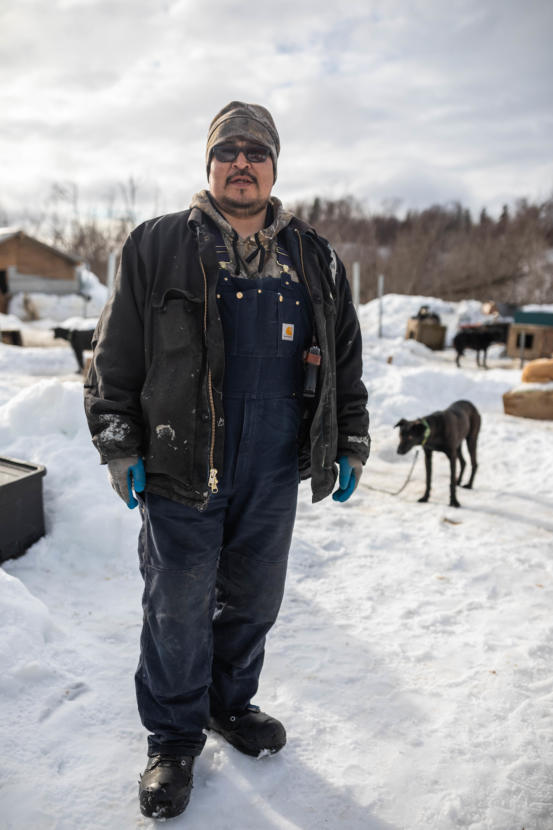
Basil Larson stands in his dog yard on March 8, 2019 in Russian Mission. He often carries a handgun while mushing for protection from wildlife. (Loren Holmes / ADN)
Larson, 35, grew up here. Playful and winking, a bear in overalls. He’s had to bring people to the City Hall building or the new public safety building, he said. Built after Simeon Askoak’s suicide, the two unpainted jail cells are mostly used by visiting troopers.
When a reporter asked for a tour in mid-March, it took officials a day to find the key. “We have a cop shop but no cops,” Larson said.
Under a state law, Mayor Sheila Minock is the chief of law enforcement for Russian Mission. A former health aide, she said neighbors like Larson are happy to help in a crisis.
This spring, a 10-year-old had to stop his father from choking a woman in his home. The victim fled the village without her belongings, according to a request filed for a domestic violence restraining order. The month after that, a father and his friend were able to restrain a 19-year-old who tried to drive drunk and had armed himself with a loaded 9 mm handgun. When the same teenager punched his sister in the face in September, bad weather prevented a Fairbanks trooper from flying in to investigate for two days.
The village would love to have a VPSO again to handle these problems, the mayor said. That would require the regional nonprofit employer, Association of Village Council Presidents, to recruit, hire and deploy someone to the community.
Finding anyone willing to lift the burden full time is a challenge, especially following Askoak’s suicide, which villagers attributed to job strain. His widow said such things are never so simple.
A spring morning
Barbie Atchak doesn’t remember any sounds on the morning that her husband shot himself. She had left the house to return a few DVDs, and she returned to find Simeon gone.
Maybe he’d walked to his sister’s house, where the church was holding choir practice.
“I stepped out on the porch and looked around to see if he might have been walking anywhere,” Atchak said. As she strolled toward the village center, someone stopped her. There had been a discovery.
No footprints surrounded Simeon’s body in the fresh snow. Troopers investigated and declared it suicide. The Alaska Department of Public Safety soon absolved itself.
In an opinion column published in the Daily News a month after Simeon’s death, the commissioner of public safety at the time, Bill Tandeske, wrote that his troopers concluded the suicide was not related to the VPSO program despite Simeon’s sharp criticism of the program 48 hours before taking his own life.
Tandeske did not say what that conclusion was based on. “Funding for the VPSO program as it is currently operating is adequate. I would like nothing better than to seek additional dollars for the program, but I’m not going to do so until we have qualified VPSOs to fill the positions,” he wrote. “The unfortunate death of Simeon Askoak leaves one more position to fill.”
Like many current and former public safety officials, Tandeske now says the program that Askoak worked for has morphed into something it was never intended to be, and a course correction is needed.
“Ultimately, with the push over time for more law enforcement services, is the VPSO program the appropriate platform to build upon?” Tandeske asked in an interview in September. “These issues have (been) going round and round for some time. Simply throwing more money at it is not the answer.”
Today
When Simeon Askoak was alive, the family always traveled together. Picking berries, hunting, cutting fish. After his death, they scattered.
Atchak moved to Bethel and remarried; her husband is the head of search and rescue for the region. Her son began to raise his family in the home she’d shared with Simeon.
-
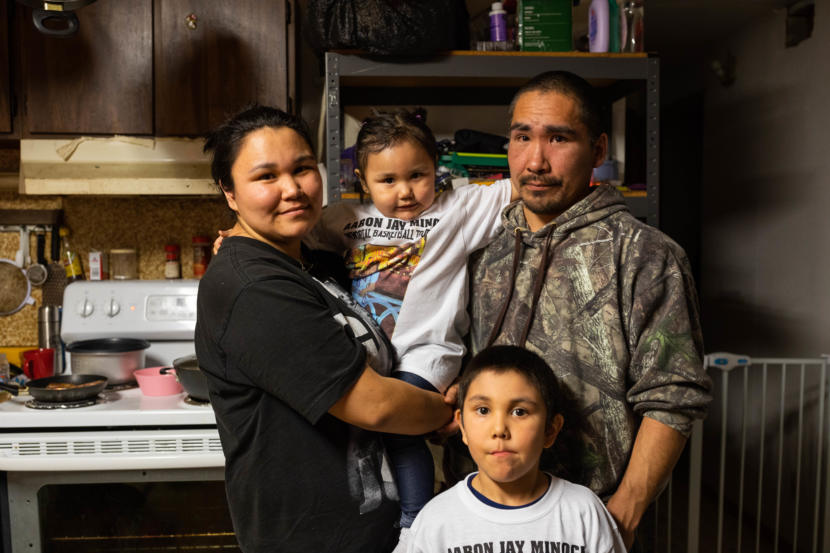
Cassandra and Nicephore Askoak and their children, Amelia, 2, and Blake, 5, in their home on March 9, 2019 in Russian Mission. Nicephore’s father Simeon Askoak was a Village Public Safety Officer in Russian Mission when he committed suicide in the spring of 2005. (Photo by Loren Holmes/Anchorage Daily News)
Nicephore Askoak — the boy who Simeon said was eager to go to school to learn Yup’ik hunting skills — is now 31. On a recent weeknight he returned from a day of trapping, hanging his parka alongside the family rifles and carrying two limp martens in his arms.
He said he hopes people remember his father as a kind man, and he can recall missing him when Simeon went away for VPSO training. While still in high school, Nicephore told a Daily News reporter, he’d grown tired of village life and was thinking of moving.
After the suicide he stayed. For a time, he attempted to follow in his father’s footsteps. Nicephore worked for 18 months as a city police officer, recruited by the Russian Mission city manager. People expected him to stop violent encounters and investigate felonies as his father had.
On the day he was called to a home and discovered the suicide of a friend, he quit for good.
Asked about his father’s death, Nicephore said that all these years later he doesn’t know what to say about it. After a long pause, he stood from the kitchen table, excusing himself to go prepare for dinner.
It’d been a long day, he said, and there was still much to do.
The Anchorage Daily News and ProPublica are spending the year investigating sexual violence across Alaska. Read the full series here. We’re particularly interested in hearing from Alaska residents and others about possible solutions. Here’s how you can stay in touch with us:
• Reach out to the reporting team anytime: alaska@propublica.org
• Share your story in our questionnaire
If you or someone you know needs help, here are some resources:
• Call the Alaska Careline at 1-877-266-HELP.
• Call the National Suicide Prevention Lifeline: 1-800-273-8255
• Text the Crisis Text Line from anywhere in the U.S. to reach a crisis counselor: 741741
• Call the national disaster distress hotline at 1-800-985-5990.
• Copline is an international law enforcement officers’ hotline, answered by trained retired officers. The hotline: 1-800-267-5463.
• For more information on the Alaska Suicide Prevention Council and suicide in Alaska, visit dhss.alaska.gov/suicideprevention.
• For more information on the signs of suicide, visit afsp.org/preventing-suicide/suicide-warning-signs.
Story editing: Charles Ornstein (ProPublica) and David Hulen (ADN). Photo editing: Anne Raup.
